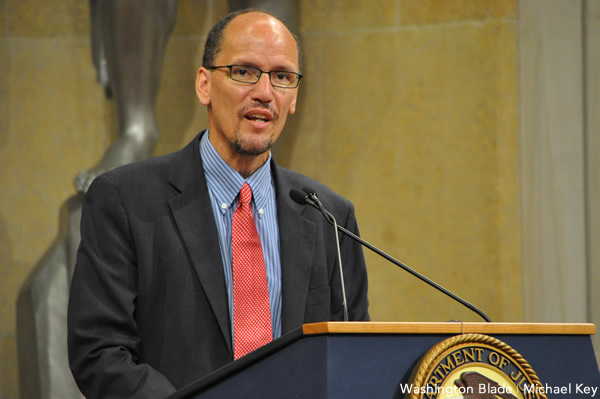Politics
New guidance grants gay couples access to pension benefits
Policy applies even in states that don’t recognize same-sex marriage

Gay workers are now fully eligible to participate with their spouses in employer-provided health care and pension benefits plans organized under federal law — even if they live in a state that doesn’t recognize their marriage — thanks to new guidance issued in the aftermath of the Supreme Court decision against the Defense of Marriage Act.
On Wednesday, the Labor Department issued guidance stating that the definition of “spouse” and “marriage” would now include married gay couples under the Employee Retirement Income Security Act of 1974.
“This is the most natural reading of those terms; it is consistent with Windsor, in which the plaintiff was seeking tax benefits under a statute that used the term ‘spouse’; and a narrower interpretation would not further the purposes of the relevant statutes and regulations,” the guidance states.
Most large corporations operating in multiple states organize their health care and pension plans under ERISA to bypass state laws and achieve a standardized system for employees working across the country. Whereas previously a company would not have recognized an employee’s same-sex spouse as a beneficiary, from this point forward, the spouse will now be designated as such.
Labor Secretary Thomas Perez noted the significance of the Windsor decision in a statement accompanying the news of the guidance.
“This decision represents a historic step toward equality for all American families, and I have directed the department’s agency heads to ensure that they are implementing the decision in a way that provides maximum protection for workers and their families,” Perez said. “The department plans to issue additional guidance in the coming months as we continue to consult with the Department of Justice and other federal agencies to implement the decision.”
According to the guidance, couples will be eligible for participating in ERISA programs even if they marry in one state and move to another where their marriage isn’t recognized under state law. The guidance describes why this interpretation of the court decision against DOMA is most appropriate in terms of ERISA.
“A rule for employee benefit plans based on state of domicile would raise significant challenges for employers that operate or have employees (or former employees) in more than one state or whose employees move to another state while entitled to benefits,” the guidance states. “Furthermore, substantial financial and administrative burdens would be placed on those employers, as well as the administrators of employee benefit plans.”
However, like other post-DOMA decisions from the administration, the guidance notes that couples in civil unions or domestic partnerships won’t be eligible for this federal benefit. They need a legal marriage.
“The terms ‘spouse’ and ‘marriage,’ however, do not include individuals in a formal relationship recognized by a state that is not denominated a marriage under state law, such as a domestic partnership or a civil union, regardless of whether the individuals who are in these relationships have the same rights and responsibilities as those individuals who are married under state law,” the guidance states.
Still, Fred Sainz, vice president of communications for the Human Rights Campaign, said his organization is happy with the guidance.
“It’s yet another positive indication of the way in which this administration is interpreting the Windsor decision,” Sainz said.
Tico Almeida, president of Freedom to Work, commended Perez after the guidance was issued, but said his department could do more for the LGBT community by aiding transgender employees “who too often face harassment and workplace discrimination.”
“Secretary Perez should officially recognize and adopt the bipartisan EEOC decision in Macy v. Holder, and he should instruct the Labor Department to start adding transgender protections into the newly signed federal contracts that are covered by the existing Executive Order 11246,” Almeida said.
Notably, the Labor Department is providing ERISA benefits for couples in legal same-sex marriages living in states that don’t recognize those unions, but made no such clarification in earlier guidance granting couples benefits under the Family & Medical Leave Act.
Almeida also called on the Labor Department to clarify this earlier guidance to grant couples FMLA benefits nationwide.
“It’s great that the Labor Department has adopted the ‘state of celebration’ rule so that gay and lesbian couples from Texas can go to California to get married and then have ERISA protections at their Texas jobs, and the Labor Department now needs to re-write the Family Medical Leave Act regulations to adopt that same ‘state of celebration’ rule so that all married couples — no matter where they live — can have job protections when a same-sex spouse is diagnosed with a serious illness,” Almeida said.
Congress
Congress passes ‘Big, Beautiful Bill’ with massive cuts to health insurance coverage
Roughly 1.8 million LGBTQ Americans rely on Medicaid

The “Big, Beautiful Bill” heads to President Donald Trump’s desk following the vote by the Republican majority in the U.S. House of Representatives Thursday, which saw two nays from GOP members and unified opposition from the entire Democratic caucus.
To partially offset the cost of tax breaks that disproportionately favor the wealthy, the bill contains massive cuts to Medicaid and social safety net programs like food assistance for the poor while adding a projected $3.3 billion to the deficit.
Policy wise, the signature legislation of Trump’s second term rolls back clean energy tax credits passed under the Biden-Harris administration while beefing up funding for defense and border security.
Roughly 13 percent of LGBTQ adults in the U.S., about 1.8 million people, rely on Medicaid as their primary health insurer, compared to seven percent of non-LGBTQ adults, according to the UCLA School of Law’s Williams Institute think tank on sexual orientation and gender identities.
In total, the Congressional Budget Office estimates the cuts will cause more than 10 million Americans to lose their coverage under Medicaid and anywhere from three to five million to lose their care under Affordable Care Act marketplace plans.
A number of Republicans in the House and Senate opposed the bill reasoning that they might face political consequences for taking away access to healthcare for, particularly, low-income Americans who rely on Medicaid. Poorer voters flocked to Trump in last year’s presidential election, exit polls show.
A provision that would have blocked the use of federal funds to reimburse medical care for transgender youth was blocked by the Senate Parliamentarian and ultimately struck from the legislation — reportedly after the first trans member of Congress, U.S. Rep. Sarah McBride (D-Del.) and the first lesbian U.S. senator, Tammy Baldwin (D-Wis.), shored up unified opposition to the proposal among Congressional Democrats.
Congress
Ritchie Torres says he is unlikely to run for NY governor
One poll showed gay Democratic congressman nearly tied with Kathy Hochul

Gay Democratic Congressman Ritchie Torres of New York is unlikely to challenge New York Gov. Kathy Hochul (D) in the state’s next gubernatorial race, he said during an appearance Wednesday on MSNBC’s “Morning Joe.”
“I’m unlikely to run for governor,” he said. ““I feel like the assault that we’ve seen on the social safety net in the Bronx is so unprecedented. It’s so overwhelming that I’m going to keep my focus on Washington, D.C.”
Torres and Hochul were nearly tied in a poll this spring of likely Democratic voters in New York City, fueling speculation that the congressman might run. A Siena College poll, however, found Hochul leading with a wider margin.
Back in D.C., the congressman and his colleagues are unified in their opposition to President Donald Trump’s signature legislation, the “Big Beautiful Bill,” which heads back to the House after passing the Senate by one vote this week.
To pay for tax cuts that disproportionately advantage the ultra-wealthy and large corporations, the president and Congressional Republicans have proposed massive cuts to Medicaid and other social programs.
A provision in the Senate version of the bill that would have blocked the use of federal funds to reimburse medical care for transgender youth was blocked by the Senate Parliamentarian and ultimately struck from the legislation, reportedly after pressure from transgender U.S. Rep. Sarah McBride (D-Del.) and lesbian U.S. Sen. Tammy Baldwin (D-Wis.).
Torres on “Morning Joe” said, “The so-called Big Beautiful Bill represents a betrayal of the working people of America and nowhere more so than in the Bronx,” adding, “It’s going to destabilize every health care provider, every hospital.”
Congress
House Democrats oppose Bessent’s removal of SOGI from discrimination complaint forms
Congressional Equality Caucus sharply criticized move

A letter issued last week by a group of House Democrats objects to Treasury Secretary Scott Bessent’s removal of sexual orientation and gender identity as bases for sex discrimination complaints in several Equal Employment Opportunity forms.
Bessent, who is gay, is the highest ranking openly LGBTQ official in American history and the second out Cabinet member next to Pete Buttigieg, who served as transportation secretary during the Biden-Harris administration.
The signatories to the letter include a few out members of Congress, Congressional Equality Caucus chair and co-chairs Mark Takano (Calif.), Ritchie Torres (N.Y.), and Becca Balint (Vt.), along with U.S. Reps. Nikema Williams (Ga.), Hank Johnson (Ga.), Raja Krishnamoorthi (Ill.), Delia Ramirez (Ill.), Joyce Beatty (Ohio), Lloyd Doggett (Texas), Eleanor Holmes Norton (D.C.), Josh Gottheimer (N.J.), and Sylvia Garcia (D-Texas).
The letter explains the “critical role” played by the EEO given the strictures and limits on how federal employees can find recourse for unlawful workplace discrimination — namely, without the ability to file complaints directly with the Employment Opportunity Commission or otherwise engage with the agency unless the complainant “appeal[s] an agency’s decision following the agency’s investigation or request[s] a hearing before an administrative judge.”
“Your attempt to remove ‘gender identity’ and ‘sexual orientation’ as bases for sex discrimination complaints in numerous Equal Employment Opportunity (EEO) forms will create unnecessary hurdles to employees filing EEO complaints and undermine enforcement of federal employee’s nondiscrimination protections,” the members wrote in their letter.
They further explain the legal basis behind LGBTQ inclusive nondiscrimination protections for federal employees in the EEOC’s decisions in Macy v. Holder (2012) and Baldwin v. Foxx (2015) and the U.S. Supreme Court’s decision in Bostock v. Clayton County (2020).
“It appears that these changes may be an attempt by the department to dissuade employees from reporting gender identity and sexual orientation discrimination,” the lawmakers wrote. “Without forms clearly enumerating gender identity and sexual orientation as forms of sex discrimination, the average employee who experiences these forms of discrimination may see these forms and not realize that the discrimination they experienced was unlawful and something that they can report and seek recourse for.”
“A more alarming view would be that the department no longer plans to fulfill its legal obligations to investigate complaints of gender identity and sexual orientation and ensure its
employees are working in an environment free from these forms of discrimination,” they added.
-

 Sports5 days ago
Sports5 days agoTrans cyclist’s victory sparks outrage in conservative media
-

 Israel5 days ago
Israel5 days agoActivist recalls experience in Tel Aviv after Israel-Iran war began
-

 Movies4 days ago
Movies4 days agoTwo new documentaries highlight trans history
-

 Real Estate4 days ago
Real Estate4 days agoCelebrate the power of homeownership this Fourth of July













